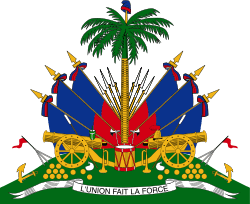1973 Haitian parliamentary election
Parliamentary elections were held in Haiti on 11 February 1973.[1] Over 300 candidates contested the election, all of whom were members of the National Unity Party and supporters of President Jean-Claude Duvalier.[2]
| |||||||||||||||||||||||||
All 58 seats in the Chamber of Deputies of Haiti 30 seats needed for a majority | |||||||||||||||||||||||||
|---|---|---|---|---|---|---|---|---|---|---|---|---|---|---|---|---|---|---|---|---|---|---|---|---|---|
| |||||||||||||||||||||||||
 |
|---|
| This article is part of a series on the politics and government of Haiti |
|
|
Legislature
|
|
Executive |
|
Judiciary |
|
Recent elections |
|
|
Results
| Party | Votes | % | Seats |
|---|---|---|---|
| National Unity Party | 58 | ||
| Invalid/blank votes | – | – | |
| Total | 58 | ||
| Source: IPU | |||
gollark: What *is* going oj ingame?
gollark: You can test this using a microphone in real life, or probably monitoring of logs of some sort in Minecraft.
gollark: 3d6: yes.
gollark: AlexDevs has a usably okay package manager.
gollark: It's great for catching all those clouds and such.
References
This article is issued from Wikipedia. The text is licensed under Creative Commons - Attribution - Sharealike. Additional terms may apply for the media files.
.jpg)